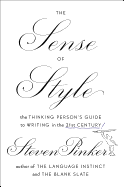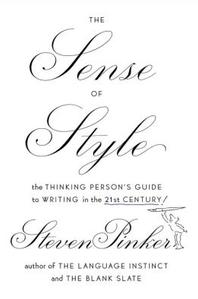

Harvard professor Pinker, chair of the Usage Panel of The American Heritage Dictionary, offers his guide for people who "know how to write and want to write better." Distinguishing it from classics like The Elements of Style (a book for which, despite shortcomings he's quick to highlight, he confesses his abiding admiration), Pinker argues that contemporary style guides "cannot just perpetuate the diktats of earlier manuals" and instead must "replace dogma about usage with reason and evidence."
In filling that gap, one of the book's most useful sections is a discussion of what Pinker calls "classic style," his recommended method of "showing the reader something in the world and engaging her in conversation." Using examples from the work of physicist Brian Greene, he illustrates how this technique helps a writer illuminate even the most technical subject matter in lucid prose.
Pinker devotes the final third of the book to an energetic debunking of myths (he prefers the Yiddish term bubbe meises, or "grandmothers' tales") that are the province of language purists. Whether addressing the prescriptivists' abhorrence of split infinitives or their condemnation of sentences that end with prepositions, Pinker painstakingly demonstrates that many of these so-called rules lack any claim to legitimacy as "proper" English. Unlike most of what precedes it, this section isn't intended to be read straight through, but instead serves as an invaluable reference when specific questions of grammar, word choice and punctuation arise.
Despite its predominantly good-natured tone, the book turns churlish in an overlong section on coherence that's mostly devoted to assailing British military historian John Keegan's reputation for graceful expression. That section can be skimmed without missing the heart of Pinker's message.
If the hard work of writing clear, fluid prose were as enjoyable as Steven Pinker makes it seem in this lively book, striving to master that task would be a much more pleasant experience. With its wealth of helpful information and its accessible approach, The Sense of Style is a worthy addition to even the most overburdened shelf of style manuals. --Harvey Freedenberg, attorney and freelance reviewer
Shelf Talker: Psycholinguist Steven Pinker delivers a contemporary style guide that will be useful to anyone seeking to become a better writer.

